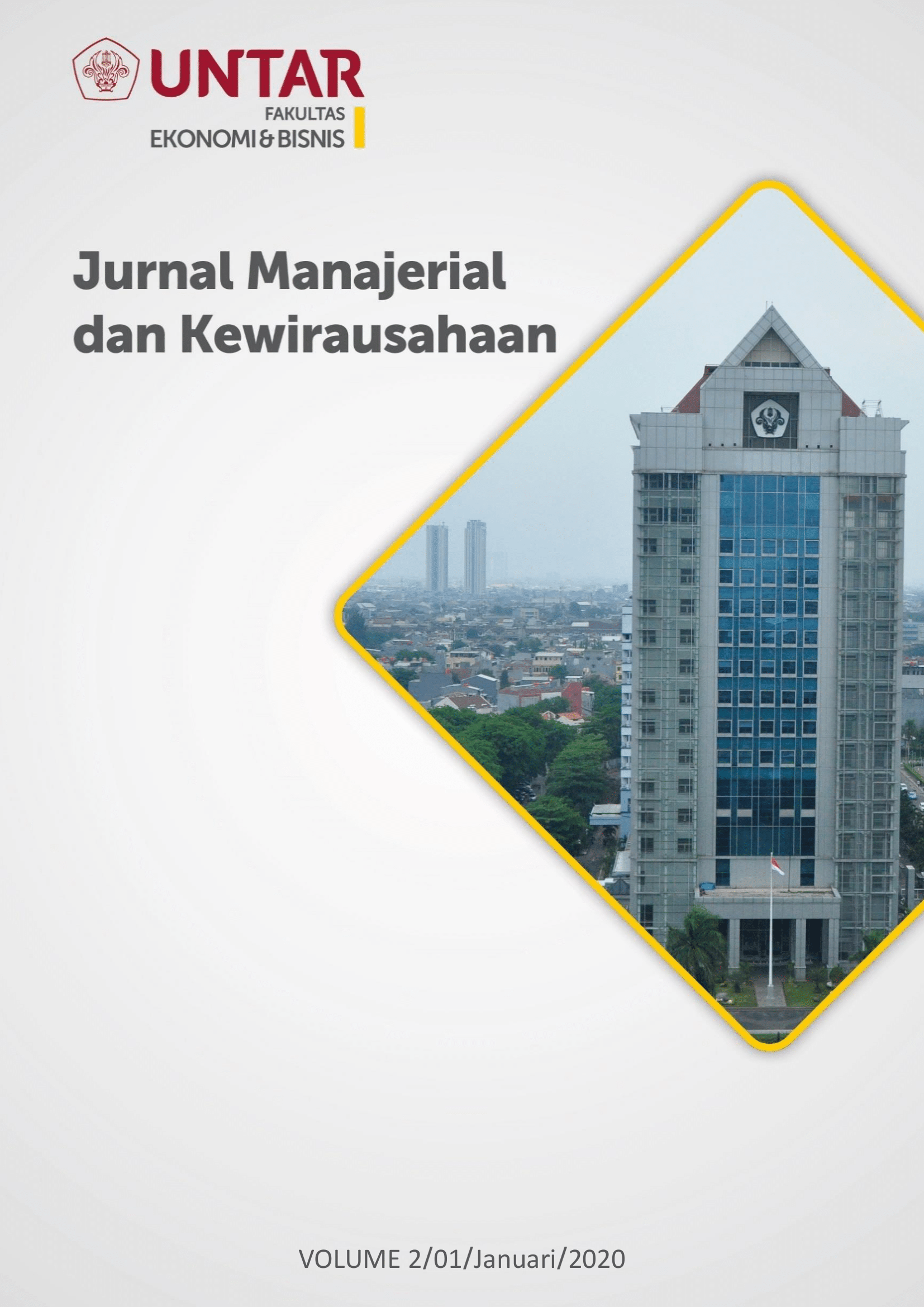Pengaruh Dukungan Pendidikan Dan Dukungan Relasi Terhadap Intensi Berwirausaha Mahasiswa Kepercayaan Diri Sebagai Variabel Moderator
Main Article Content
Abstract
The purpose of this research is to examine whether: 1) educational support can affect entrepreneurial intention 2) relational support can affect entrepreneurial intention 3) self-confidence moderates the relationship between educational support and entrepreneurial intentions 4) Self-confidence moderates the relationship between relational support and entrepreneurial intentions. Sample was selected using nonprobability sampling technique to 125 respondents of university students. Data were measured by Likert scale and analyzed with processing techniques using SmartPLS 3.0 program. The result of this study shows that 1) educational support positively had affect on entrepreneurial intention 2) relational support positively had affect on entrepreneurial intention 3) self-confidence weaken the relationship between educational support with entrepreneurial intentions and 4) confidence strengthens the relationship between relationship support and entrepreneurial intentions. Several recommendations for research are presented based on conclusions and suggestions on the results of this study.
Tujuan dari penelitian ini adalah untuk menguji apakah: 1) dukungan pendidikan dapat mempengaruhi intensi berwirausaha, 2) dukungan relasi dapat mempengaruhi intensi berwirausaha, 3) kepercayaan diri memoderasi hubungan antara dukungan pendidikan dengan intensi berwirausaha, dan 4) kepercayaan diri memoderasi hubungan antara dukungan relasi dengan intensi berwirausaha. Sampel dipilih menggunakan teknik nonprobability sampling dengan jumlah 125 responden mahasiswa. Data diukur dengan skala Likert dan dianalisis dengan teknik proses yang menggunakan program SmartPLS 3.0. Secara keseluruhan, hasil penelitian ini menunjukkan bahwa 1) dukungan pendidikan berpengaruh positif terhadap intensi berwirausaha, 2) dukungan relasi berpengaruh positif terhadap intensi berwirausaha, 3) kepercayaan diri memperlemah hubungan antara dukungan pendidikan dengan intensi berwirausaha, dan 4) kepercayaan diri memperkuat hubungan antara dukungan relasi dengan intensi berwirausaha. Beberapa rekomendasi untuk penelitian disajikan berdasarkan kesimpulan dan saran mengenai hasil penelitian ini.
Article Details
This work is licensed under a Jurnal Muara Ilmu Ekonomi dan Bisnis Creative Commons Attribution-ShareAlike 4.0 International License.,/p>
References
Ajzen, I. (1991). The theory of planned behavior. Organizational Behavior and Human Decision Process, 50, 179–211.
Baughn, C. C., Chua, B. L. and Neupert, K. E. (2006). The normative context for women’s participation in entrepreneruship: a multicountry study. Entrepreneurship Theory and Practice, Vol. 30, No. 5, pp. 687-708.
Be´nabou, R. and Tirole, J. (2002). Self-confidence and personal motivation. The Quarterly Journal of Economics, Vol. 117, No. 3, pp. 871-915.
Bray, I., Kenny, G., Pontin, D., Williams, R. and Albarran, J. (2016). Family presence during resuscitation: validation of the risk-benefit and self-confidence scales for student nurses. Journal of Research in Nursing, Vol. 21, No. 4, pp. 306-322.
Burns, A. C., & Bush, R. F. (2014). Marketing Research (7th ed.). England: Pearson Education Limited.
Dell, M. S. (2008). An investigation of undergraduate student self-employment intention and the impact of entrepreneurship education and previous entrepreneurial experience. Doctor of Philosophy, School of Business University The Australia.
Dinis, A., Paço, A.F., Ferreira, J., Raposo, M. and Rodrigues, R.G. (2013). Psychological characteristics and entrepreneurial intentions among secondary students. Education+Training, Vol. 55, Nos 8/9, pp. 763-780
Gelaidan, H. M., Abdullateef, A. O. (2017). Entrepreneurial intentions of business students in Malaysia: The role of self-confidence, educational and relation support. Journal of Small Business and Enterprise Development, 24(1), 54-67.
Gerba, D. T. (2012). The context of entrepreneurship education in Ethiopian universities. Management Research Review, Vol. 35, Nos 3/4, pp. 225-244.
Hair, J. F., Ringle, C. M., & Sarstedt, M. (2011). PLS-SEM: Indeed a Silver Bullet. The Journal of Marketing Theory and Practice, 19(2), 139-151.
Hamidon, S. (2012). Entrepreneurship development in Malaysian higher education: Challenges, opportunities and way forward. Hangzhou: UNESCO-APEID.
Henderson, R., & Robertson, M. (2000). Who wants to be an entrepreneur? Young adult attitudes to entrepreneurship as a career. Career Development International, 5(6), 279-287.
Henseler, J., Ringle, C. M., & Sinkovics, R. R. (2009). The use of partial least square path modeling in International Marketing. Advances in International Marketing, 20, 277-319.
Ismail, M., Khalid, S.A., Othman, M., Jusoff, H.K., Rahman, N.A., Kassim, K.M. and Zain, R.S. (2009). Entrepreneurial intention among Malaysian under graduates. International Journal of Business and Management, Vol. 4, No. 10, p. 54.
Kolvereid, L. and Moen, Ø. (1997). Entrepreneurship among business graduates: does a major in entrepreneurship make a difference? Journal of European Industrial Training, Vol. 21, No. 4, pp. 154-60.
Lafuente, M., Remesal, A. and Álvarez Valdivia, I. M. (2014). Assisting learning in eassessment: a closer look at educational supports. Assessment and Evaluation in Higher Education, Vol. 39, No. 4, pp. 443-460.
Robb, A. M. and Fairlie, R. W. (2006). Tracing access to financial capital among African Americans from the entrepreneurial venture to the established business. Research Conference on Entrepreneurship Among Minorities and Women.
Sekaran, U., & Bougie, R. (2013). Research Methods for Business (6th ed.). Italy: Printer Trento Srl.
Souritaris, V., Zerbinati, S. and Al-Laham, A. (2007). Do entrepreneurship program raise entrepreneurial intention of science and engineering student? The effect of learning, inspiration and resource. Journal of business Venture, Vol. 22, No. 4, pp. 566- 591
Stel, A., Carree, M. and Thurik, A. R. (2005). The effect of entrepreneurial activity on national economic growth. Small Business Economics, Vol.24 No. 3, pp.311-321.
Thompson, J.L. (1999). A strategic perspective of entrepreneurship. International Journal of Entrepreneurial Behaviour and Research, Vol. 5, No. 6, pp. 279-296.
Turker, D., & Selcuk, S. S. (2009). Which factors affect entrepreneurial intention of university students? Journal of European Industrial Training, 33(2), 142–159.
Twibell, R. S., Siela, D., Riwitis, C., Wheatley, J., Riegle, T., Bousman, D., Cable, S., Caudill, P., Harrigan, S., & Hollars, R. (2008). Nurses’ perceptions of their selfconfidence and the benefits and risks of family presence during resuscitation. American Journal of Critical Care, 17(2), 101–111.
Yun Hee Cho, Joo-Heon Lee. (2018). Entrepreneurial orientation, entrepreneurial education and performance. Asia Pacific Journal of Innovation and Entrepreneurship, Vol. 12, No. 2, pp.124-134,
Yurtkoru, S. Ku?cu, Z. K., & Do?anay, A. (2014). Exploring the Antecedents of Entrepreneurial Intention on Turkish University Students. Procedia- Social and Behavioral Sciences, 150, 841-850



